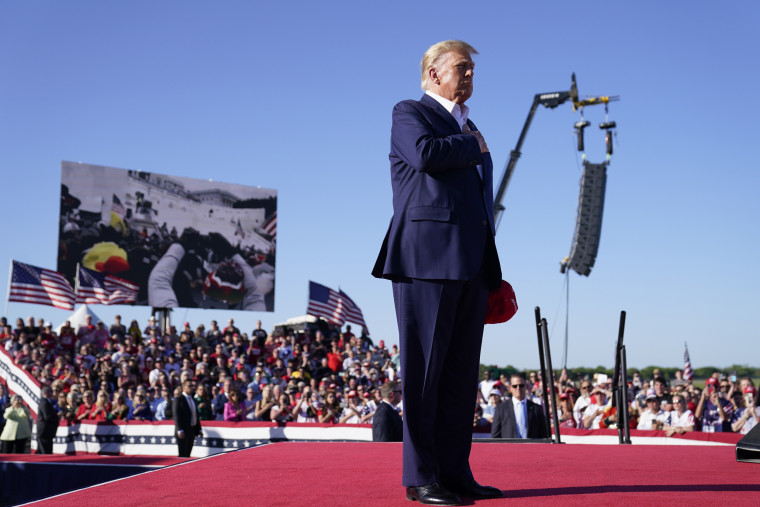At his weekend rally in Waco, Texas, former President Donald Trump played a recording of “Justice for All,” reportedly performed by “Donald J. Trump and the J6 Choir.” The audio file was accompanied by video of rioters storming the U.S. Capitol on Jan. 6, 2021. Released this month on Trump loyalist Steve Bannon’s “War Room” podcast, the piece intersperses “The Star-Spangled Banner” sung by a group of jailed insurrectionists with Trump reciting the Pledge of Allegiance in the most sanctimonious cadences imaginable. It closes with chants of “U-S-A! U-S-A!”
“Justice for All” has all the trappings of a home-grown, weaponizable anthem, or what I prefer to call a “para-anthem.”
The choir’s tune will undoubtedly become part of MAGA’s heavy rotation. Trump has already co-opted the Village People’s “YMCA” and the Rolling Stones’ “You Can’t Always Get What You Want” into his soundscape. While those pop hits have been wrenched from their original cultural context and repurposed, “Justice for All” has all the trappings of a home-grown, weaponizable anthem, or what I prefer to call a “para-anthem.”
Journalists have set “Justice for All” within the context of Trump’s ongoing efforts to simultaneously deny and launder his attempted overthrow of the U.S. government. That’s understandable, but it’s also important to analyze the recording itself as a form of self-consciously right-wing cultural production, art that is explicitly created and disseminated as a form of ideological warfare.
Think, for example, of John McNaughton (described by New York magazine as a “Pro-Trump propaganda painter”), who has achieved fame and fortune depicting his idol as a synthesis of God, hunk and statesman. Though people opposed to Trump might dismiss this work, the truth is creative products that explicitly and aggressively challenge liberal conceptions of tolerance, diversity, secularism, multiculturalism — and even reality itself — have a considerable audience.
“Justice for All” soon will have been viewed close to a million times on YouTube. Three weeks ago, it had already been downloaded (as opposed to being streamed, which is a quite different metric of audience size and demographics) 22,000 times on iTunes.
Some might argue that this conservative art, popular as it might be, has no aesthetically redeeming value. Maybe, but ultimately that’s irrelevant. Trump and his team place aesthetics singularly in the service of ideological conquest.
A professional sound engineer whom I asked to listen to “Justice for All,” responded, “As easy as it is to make high-quality recordings nowadays, we have technology to make them sound low-quality, too.” In other words, the poor sound quality of “Justice for All” may just be part of the aesthetic. All the better to sonically suggest the deprivation experienced by the imprisoned rioters whom Trump and conservatives are determined to recast as suffering martyrs. The creative product bends to the will of political expediency.
The recording doesn’t come with liner notes, and there are obvious questions: Who recorded this and how? The sound engineer I spoke to was fairly certain this was recorded on a phone. Was a phone smuggled into the D.C. Jail, which houses, among others, Jan. 6 suspects awaiting trial and “felons awaiting transfer to the Federal Bureau of Prisons”? If so, uh, shouldn’t we be concerned about that?
How many “performers” were there, and how did they manage to make it through the multi-octave obstacle course that is our national anthem? Are group singing exercises part of every incarcerated person’s daily itinerary in the U.S.? Did some guard gather a gaggle of insurrectionists in a room before lockdown and gift them a tuning fork and a few minutes of his inattention? How did this all come together?
Is the recording even real? Not that it matters to MAGA. The production accomplishes what it needs to accomplish as propaganda.
Is it art? At this point, it really doesn’t matter.
The tune is especially insidious in another way. As with variants of American flags featuring the so-called Thin Blue Line representing law enforcement, the J6 Prison Choir is offering us a variant national anthem — a “real” anthem for “real” Americans. “Justice for All” is a para-anthem in the way that a militia in the U.S. is a para-military. It derides the government’s armed forces all while wishing to become that government.
Expect this recording to become a new standard for MAGA faithful. In some places where Trump loyalists are in power, it will be piped in as the musical opening for sporting events, PTA meetings and white evangelical church services. The task of this art is to sow division.
Adding to the recording’s toxicity is its framing of people who tried to overthrow the U.S. government as political prisoners, dissidents, people of great conscience subjected to state tyranny. Thus, the visual for “Justice for All” is a drawing from inside a dingy gray prison cubicle. The walls are scratched off to mark the days of captivity. Barbed wire obscures Old Glory. A similar feat of performance art was pulled off at CPAC, where a replica of a jail cell was staged with a Crying MAGA Man wearing an orange jumpsuit.
Is it art? At this point, it really doesn’t matter. Given the reach and pervasiveness of ultraconservative creative expression, it’s extremely dangerous. The MAGA juggernaut is built (and funded) to dominate every single news cycle. The operation is structured to fling more outrageous content at the country in one day than it can possibly process in a year. If “the cruelty is the point,” then saturation is the delivery mechanism.
The pervasiveness and danger of ultraconservative creative expression demand that we analyze its appeal and its spread with all the tools of artistic analysis at our disposal. Laughing at its awfulness may cause us to miss just how much it resonates with Trump’s most loyal supporters.
